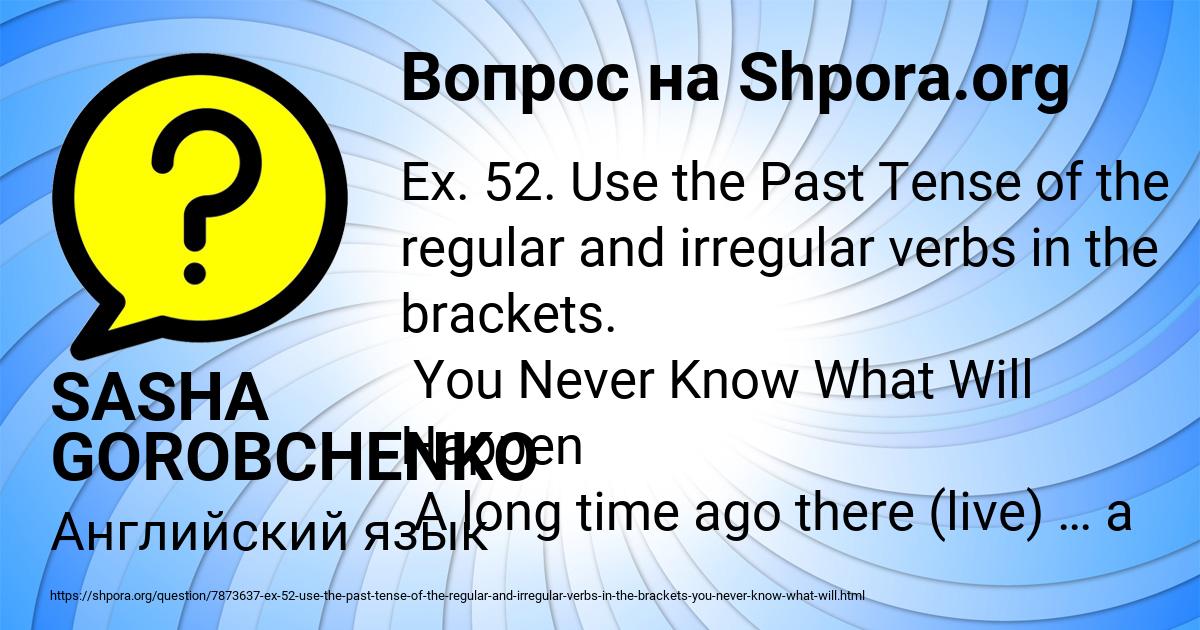Ex. 52. Use the Past Tense of the regular and irregular verbs in the brackets. You Never Know What Will Happen A long time ago there (live) … a Poor Chinese peasant. One day a beautiful horse (appear) … . When the peasant’s friends (see) ... The horse, they (say) … , “How lucky you are!”. The peasant (respond) …, “You never know what will happen.” After two days, the horse (run) ... away. The peasant’s friends (come) … and (say) …, “What a terrible thing. How unlucky you are! The fine horse (run) … away”. The peasant (get, not) … excited. He simply (say) …, “You never know what will happen.” Exactly one week later, the horse (return) …, and it (bring) … three other horses. When the peasants friends (see) ... the horses, they said to their friend, “Oh. You are so lucky. You now have four horses to help you”. The peasant (look) … at them and once again said, “You never know what will happen.” The next morning the peasant’s oldest son was in the field. Suddenly one of the horses (run) … into him, and the boy (fall) … to the ground. He was badly hurt. He (become) … crippled. Indeed, this was terrible, and many people (come) … to the peasant and (express) … their sorrow for his son’s misfortune. But the peasant simply said, “You never know what will happen.” A month after the son’s accident, soldiers (ride) … into the village. They (shout) …, “There are problems along the border. We are taking every healthy young man to fight.” The soldiers (take) … every other young man, but they (take, not) … the peasant’s son. Every other young man (fight) … in the border war, and every man (die) … . But the peasant’s son (live) … a long and happy life. As his father (say) … , you never know what will happen.
Poor Chinese peasant. One day a beautiful horse (appear) … . When the peasant’s friends (see) ... The horse, they (say) … , “How lucky you are!”. The peasant (respond) …, “You never know what will happen.” After two days, the horse (run) ... away. The peasant’s friends (come) … and (say) …, “What a terrible thing. How unlucky you are! The fine horse (run) … away”. The peasant (get, not) … excited. He simply (say) …, “You never know what will happen.” Exactly one week later, the horse (return) …, and it (bring) … three other horses. When the peasants friends (see) ... the horses, they said to their friend, “Oh. You are so lucky. You now have four horses to help you”. The peasant (look) … at them and once again said, “You never know what will happen.” The next morning the peasant’s oldest son was in the field. Suddenly one of the horses (run) … into him, and the boy (fall) … to the ground. He was badly hurt. He (become) … crippled. Indeed, this was terrible, and many people (come) … to the peasant and (express) … their sorrow for his son’s misfortune. But the peasant simply said, “You never know what will happen.” A month after the son’s accident, soldiers (ride) … into the village. They (shout) …, “There are problems along the border. We are taking every healthy young man to fight.” The soldiers (take) … every other young man, but they (take, not) … the peasant’s son. Every other young man (fight) … in the border war, and every man (die) … . But the peasant’s son (live) … a long and happy life. As his father (say) … , you never know what will happen.
Lived ,appeared, saw ,said, said, wounds, came, said, ran, said, not is back, brought, saw, ran, fell, came, was, expressed, was, driving, shouted, took, took, fought, died, lived, said.
Также наши пользователи интересуются:
Как будет по фронцуски бежатьДо поданих слiв добери риму: Весна, сонце, квiти, заспiваю, збираэ, парусами.
⭐⭐⭐⭐⭐ Лучший ответ на вопрос «Ex. 52. Use the Past Tense of the regular and irregular verbs in the brackets. You Never Know What Will Happen A long time ago there (live) … a » от пользователя SASHA GOROBCHENKO в разделе Английский язык. Задавайте вопросы и делитесь своими знаниями.
Открой этот вопрос на телефоне - включи камеру и наведи на QR-код!
